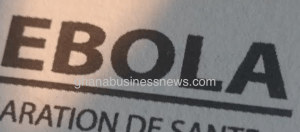UN agencies fund Ebola emergency preparedness in Ghana
 The Ghana Coalition of Non-Governmental Organisation in Health has sought funding from two United Nation Agencies to scale up emergency preparedness of the Ebola disease.
The Ghana Coalition of Non-Governmental Organisation in Health has sought funding from two United Nation Agencies to scale up emergency preparedness of the Ebola disease.
The agencies, the UNAIDS and the World Health Orgnisation (WHO) are also supporting the coalition to build capacity of the civil society organisations (CSOs) in the country for health service delivery especially emergency response and immunisation.
According to the coalition, the UNAIDS is assisting it with GH¢190,000.00 to intensify public education and Ebola surveillance and control in Greater Accra , Brong-Ahafo, Central, Western and Eastern Regions.
More than 200 CSOs will benefit from the capacity building, fundraising skills, effective reporting skill, project management, results-based monitoring and evaluation of projects.
Dr Gabriel Gbiel Bernakuu, the National Chairman of the Coalition who made this known, said the WHO/Ministry of Health had allocated GH¢110,000.00 to the coalition to build the capacity of the members so that they would be able to conduct the campaign effectively.
He was speaking at the opening session of a step down capacity building workshop for Brong-Ahafo Regional members of the health coalition in Sunyani.
The one-day workshop was also aimed at sensitizing the coalition’s members on the six month project on Ebola/HIV.
The more than 50 participants were taken through introduction to meeting reports writing, project management in practice, evidence-based monitoring and evaluation, planning and implementation of projects.
They were educated on power point presentation skills, use of social media, fundraising in this difficult times and the use of antimicrobial manual and data collection.
Dr Bernakuu who is the Chief Executive Officer of MIHOSO International, noted that because national education and emergency preparedness on the deadly Ebola disease was not well decentralised, the education has not gone down well with the people.
He also said the pneumococcal meningitis response in the country still needed much to be desired because of non-availability of educational materials and non-use of local languages.
Dr Bernakuu said though the Ebola virus had not still been detected in the country, the national campaign and surveillance must be intensified at strategic areas, especially various border towns in and across the country.
He said all the 35 border districts and territorial waters should be strengthened and emergency preparedness made visible and practical.
Dr Bernakuu entreated CSOs to take opportunity of the internet to research and explore so that they could access funding for their projects.
Source: GNA
